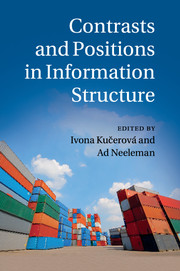Book contents
- Frontmatter
- Contents
- List of Contributors
- 1 Introduction
- Part I The architecture of grammar and the primitives of information structure
- 2 Predicate integration: phrase structure or argument structure?
- 3 Wh-intonation and information structure in South Kyeongsang Korean and Tokyo Japanese
- 4 Grammatical marking of givenness
- 5 Interface configurations: identificational focus and the flexibility of syntax
- 6 Focus and givenness: a unified approach
- 7 The locality of focusing and the coherence of anaphors
- Part II Exploring the interfaces: case studies
- Bibliography
- Index
6 - Focus and givenness: a unified approach
from Part I - The architecture of grammar and the primitives of information structure
Published online by Cambridge University Press: 05 August 2012
- Frontmatter
- Contents
- List of Contributors
- 1 Introduction
- Part I The architecture of grammar and the primitives of information structure
- 2 Predicate integration: phrase structure or argument structure?
- 3 Wh-intonation and information structure in South Kyeongsang Korean and Tokyo Japanese
- 4 Grammatical marking of givenness
- 5 Interface configurations: identificational focus and the flexibility of syntax
- 6 Focus and givenness: a unified approach
- 7 The locality of focusing and the coherence of anaphors
- Part II Exploring the interfaces: case studies
- Bibliography
- Index
Summary
Three phenomena, or two, or one?
The distribution of accents in a sentence in English is affected by context in a systematic way. This chapter looks at three particular kinds of such prosodic effects – those of question–answer congruence, contrast, and givenness – and presents evidence – some new, some already presented in Wagner (2005, 2006b) – that all three should be treated as reflexes of the same underlying phenomenon.
For the purposes of this chapter, I will only consider the location of the last accent in a sentence (marked in small caps), which can be followed by unaccented material or material that is at least heavily pitch-reduced (marked by underlining). My examples will not indicate whether or where there are any preceding accents in the sentence. This simplification of the data is not meant to imply that pre-final accents are not relevant or altogether absent. Rather, it is motivated by the observation that when narrow focus has the effect that the location of the final prominence in an utterance is shifted toward an earlier word, this leads to a much clearer perceptual effect than when it does not (Breen et al. 2010, and references therein), and hence intuitions are clearer. This privileged role of the last accent may simply be due to the fact that any shift in its location is perceptually much more salient, or it may point to a deeper difference in the semantic/pragmatic import of final and pre-final accents – a question that this chapter will not address (see Büring, chapter 2 of this volume, for a relevant discussion of pre-nuclear accents).
- Type
- Chapter
- Information
- Contrasts and Positions in Information Structure , pp. 102 - 147Publisher: Cambridge University PressPrint publication year: 2012
- 31
- Cited by

